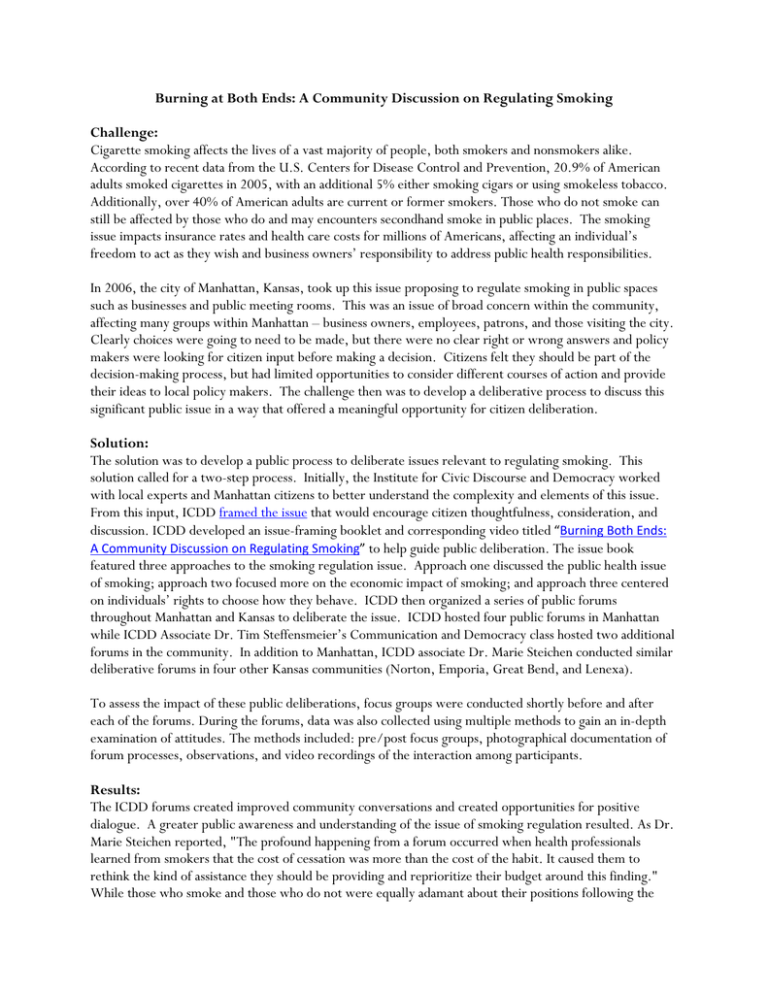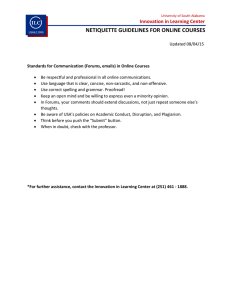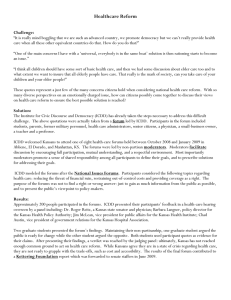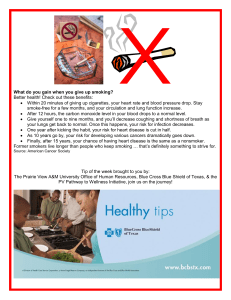Burning at Both Ends: A Community Discussion on Regulating Smoking Challenge:
advertisement

Burning at Both Ends: A Community Discussion on Regulating Smoking Challenge: Cigarette smoking affects the lives of a vast majority of people, both smokers and nonsmokers alike. According to recent data from the U.S. Centers for Disease Control and Prevention, 20.9% of American adults smoked cigarettes in 2005, with an additional 5% either smoking cigars or using smokeless tobacco. Additionally, over 40% of American adults are current or former smokers. Those who do not smoke can still be affected by those who do and may encounters secondhand smoke in public places. The smoking issue impacts insurance rates and health care costs for millions of Americans, affecting an individual’s freedom to act as they wish and business owners’ responsibility to address public health responsibilities. In 2006, the city of Manhattan, Kansas, took up this issue proposing to regulate smoking in public spaces such as businesses and public meeting rooms. This was an issue of broad concern within the community, affecting many groups within Manhattan – business owners, employees, patrons, and those visiting the city. Clearly choices were going to need to be made, but there were no clear right or wrong answers and policy makers were looking for citizen input before making a decision. Citizens felt they should be part of the decision-making process, but had limited opportunities to consider different courses of action and provide their ideas to local policy makers. The challenge then was to develop a deliberative process to discuss this significant public issue in a way that offered a meaningful opportunity for citizen deliberation. Solution: The solution was to develop a public process to deliberate issues relevant to regulating smoking. This solution called for a two-step process. Initially, the Institute for Civic Discourse and Democracy worked with local experts and Manhattan citizens to better understand the complexity and elements of this issue. From this input, ICDD framed the issue that would encourage citizen thoughtfulness, consideration, and discussion. ICDD developed an issue-framing booklet and corresponding video titled “Burning Both Ends: A Community Discussion on Regulating Smoking” to help guide public deliberation. The issue book featured three approaches to the smoking regulation issue. Approach one discussed the public health issue of smoking; approach two focused more on the economic impact of smoking; and approach three centered on individuals’ rights to choose how they behave. ICDD then organized a series of public forums throughout Manhattan and Kansas to deliberate the issue. ICDD hosted four public forums in Manhattan while ICDD Associate Dr. Tim Steffensmeier’s Communication and Democracy class hosted two additional forums in the community. In addition to Manhattan, ICDD associate Dr. Marie Steichen conducted similar deliberative forums in four other Kansas communities (Norton, Emporia, Great Bend, and Lenexa). To assess the impact of these public deliberations, focus groups were conducted shortly before and after each of the forums. During the forums, data was also collected using multiple methods to gain an in-depth examination of attitudes. The methods included: pre/post focus groups, photographical documentation of forum processes, observations, and video recordings of the interaction among participants. Results: The ICDD forums created improved community conversations and created opportunities for positive dialogue. A greater public awareness and understanding of the issue of smoking regulation resulted. As Dr. Marie Steichen reported, "The profound happening from a forum occurred when health professionals learned from smokers that the cost of cessation was more than the cost of the habit. It caused them to rethink the kind of assistance they should be providing and reprioritize their budget around this finding." While those who smoke and those who do not were equally adamant about their positions following the forums, they believed they better understood the perspectives of those who did not agree with them, expressed gratitude for the way the public conversation was conducted, and felt they had the opportunity to speak freely about their position. The ICDD process also created new avenues for local influence on public policy as the smoking forums contributed to the successful passage of the Clean Air Manhattan smoking ordinance. Finally, the forums also helped to narrow the gap between citizens and their elected officials. It was learned through these forums that the public wishes elected officials would be more present at public forums and hear what the public thinks. Citizens also expressed their desire to be involved in civic issues if that involvement were conducted in a non-contentious way and believed these forums were far more productive than many of the forums and discussions typically held by policy makers. One elected official who attended the forums expressed appreciation for the opportunity to learn from the public in the kind of moderated discussion the forums had produced.





